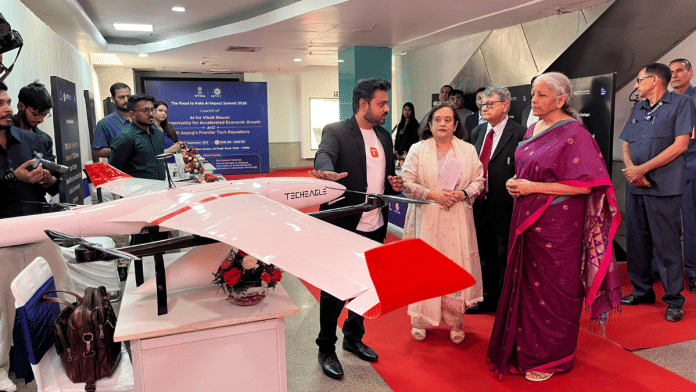New Delhi: As Artificial Intelligence (AI) becomes all pervasive and debate rages over its role, Finance Minister Nirmala Sitharaman batted for the need to regulate such technologies as they have potential to not only benefit but harm the society as well.
“While AI poses a challenge to the job market, it also has the potential to do things that are not for the betterment of society,” Sitharaman said Monday at the launch of the NITI Aayog report, ‘AI for Viksit Bharat: The Opportunity for Accelerated Economic Growth.’
There is a need for regulations to run at par with AI adoption to keep a check on the evolving nature of this technology, she asserted.
At the same time, Sitharaman asserted that India cannot afford to be behind in the arena of frontier technologies. ”India must aim for its leadership.”
The report was released in the presence of Minister of Electronics and IT Ashwini Vaishnaw, NITI Aayog vice-chairperson Suman Bery and CEO B.V.R Subrahmanyam among others.
The report highlighted that while AI has the potential to create new roles, it may displace many existing jobs in clerical, routine, and low-skill segments.
Nearly 35 to 40 percent of jobs worldwide are exposed to AI, with higher exposure in advanced economies and meaningful effects in emerging markets, according to the report.
To address the impact of AI on the Indian job market, the report cites preparing a workforce with advanced digital and AI skills to capture new opportunities while ensuring that those displaced are re-employed through reskilling, redeployment, or absorption into other growth sectors of the economy.
It cites the need for inclusive growth by providing equitable access of AI resources and opportunities to Micro, Small, and Medium Enterprises (MSMEs), which currently remain under-represented.
“MSMEs often can’t access High Performance Computing labs, 3D printing centres, or plug-and-play SaaS AI tools due to cost, geography, or lack of knowledge, widening the gap between large original equipment manufacturers and small suppliers,” the report states.
Boosting India’s economy
By harnessing AI-related opportunities across industries, India has a potential to unlock 8 percent Gross Domestic Product (GDP) growth over next decade from the current level of 5.7 percent, says NITI Aayog report.
With enhanced AI adoption, the GDP has potential to reach $8.3 trillion by 2035 but settle at $6.6 trillion at the current level of growth.
“India’s mission to sustain over 8 percent growth is anchored in bold, pervasive AI integration and tireless innovation—and must become a core national priority,” NITI Frontier Tech Hub chief architect Debjani Ghosh said at the event.
There are two main levers for unlocking AI potential–accelerating AI adoption across industries and leapfrogging innovation by transforming research and development using generative AI.
Subrahmanyam spoke extensively on unlocking AI opportunities. “First, accelerating adoption of Al across industries to enhance productivity and efficiency-bridging nearly 30-35 percent of the required step-up,” the NITI Aayog CEO said. “Second, transforming R&D, especially through generative Al, which can enable India to leapfrog into innovation-driven global opportunities, contributing at least 20-30 percent of the required uplift.”
According to the report, financial services and manufacturing sectors are at the forefront of AI adoption. Together, both can unlock the potential GDP value of $135 billion to $155 billion using AI-led productivity and efficiency improvement.
For the banking sector, AI can help automate compliance, fraud detection, and risk management at back-office functions, while virtual relationship managers can deliver personalised customer experiences at the front office.
In the manufacturing sector, AI has the potential to lower the cost of production and improve output yields via predictive maintenance. It also has the potential of powering intelligent product design, real-time quality control, and mass customisation, the report adds.
(Edited by Tony Rai)
Also Read: Why YEIDA’s Toy Park is struggling to take off despite UP govt push and strategic location






